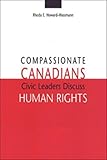Compassionate Canadians : Civic Leaders Discuss Human Rights / Rhoda E. Howard-Hassmann.
Material type: TextPublisher: Toronto : University of Toronto Press, [2003]Copyright date: ©2003Description: 1 online resource (304 p.)Content type:
TextPublisher: Toronto : University of Toronto Press, [2003]Copyright date: ©2003Description: 1 online resource (304 p.)Content type: - 9780802036643
- 9781442673182
- 323/.0971
- JC599.C2
- online - DeGruyter
| Item type | Current library | Call number | URL | Status | Notes | Barcode | |
|---|---|---|---|---|---|---|---|
 eBook
eBook
|
Biblioteca "Angelicum" Pont. Univ. S.Tommaso d'Aquino Nuvola online | online - DeGruyter (Browse shelf(Opens below)) | Online access | Not for loan (Accesso limitato) | Accesso per gli utenti autorizzati / Access for authorized users | (dgr)9781442673182 |
Browsing Biblioteca "Angelicum" Pont. Univ. S.Tommaso d'Aquino shelves, Shelving location: Nuvola online Close shelf browser (Hides shelf browser)

|

|

|

|

|

|

|
||
| online - DeGruyter Community, State, and Market on the North Atlantic Rim : Challenges to Modernity in the Fisheries / | online - DeGruyter Companions of the Peace : Diaries and Letters of Monica Storrs, 1931-1939 / | online - DeGruyter A Comparative Study of Old English Metre / | online - DeGruyter Compassionate Canadians : Civic Leaders Discuss Human Rights / | online - DeGruyter Concise Encyclopedia Ukraine / | online - DeGruyter Concise Historical Atlas of Canada / | online - DeGruyter Conduct Unbecoming : The Story of the Murder of Canadian Prisoners of War in Normandy / |
restricted access online access with authorization star
http://purl.org/coar/access_right/c_16ec
Do Canadians, as a group, possess a strong ethical code when thinking about human rights issues? They do, according to Rhoda E. Howard-Hassmann who has analyzed the responses of 78 civic leaders from Hamilton, Ontario whom she interviewed over several months in 1996 and 1997. Their responses to questions about hate speech, hate crimes, gay and lesbian rights, multiculturalism, employment equity, aboriginal rights, the rights of the poor, and an individual's obligation to 'strangers' ? defined as immigrants, refugees, and people living outside Canada's borders ? revealed deep and complex reasoning about ethical concerns, and exhibited a strong unified sense of what it means to be Canadian.The civic leaders interviewed represented many diverse groups: members of gay and lesbian groups, feminist organizations, aboriginal groups, and leaders of service organizations, private clubs, and patriotic organizations. Slightly more than half were women, and slightly fewer than half were immigrants to Canada.In their responses, these individuals stressed the importance of both belonging to and having obligations to the Canadian community. They highlighted the values of equality, non-discrimination, and multiculturalism, as well as the need to respect everyone living in Canada. For them, there were no absolute individual rights: all rights must be balanced with concern for vulnerable groups in Canada.Understanding the moral reasoning of these civic leaders helps to illuminate the moral consensus among ordinary Canadian citizens around the formal human rights laws that govern Canada. It also illustrates the sort of human rights policies that Canadians are likely to support.
Mode of access: Internet via World Wide Web.
In English.
Description based on online resource; title from PDF title page (publisher's Web site, viewed 01. Nov 2023)


